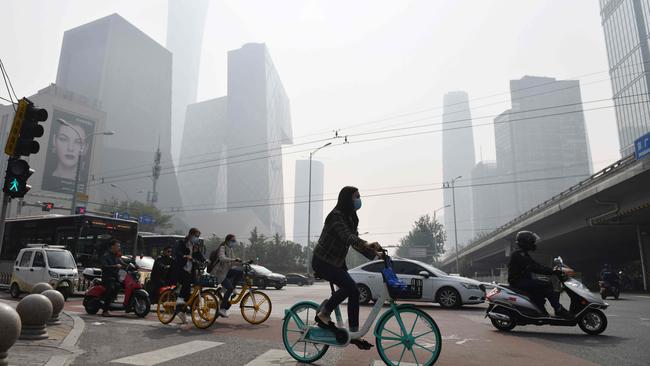PM’s rationale for net-zero emissions target must be economic


Despite what the political media class thinks, the chief threat to the net-zero target is not conservative voters, but corporations and China. ANZ chief executive Shayne Elliott belled the cat when he warned there is “too much money” in the system for green investment, which heightens risks of greenwashing. To prevent firms fleecing investors, creating universal standards with greater transparency and accountability is critical.
Greenwashing refers to the habit of promoting green credentials in public but engaging in practices that significantly damage the natural environment. In Australia, many companies leading climate campaigns have a questionable track record themselves. The Climate Leaders Coalition includes Rio Tinto, BHP, Commonwealth Bank and Fortescue Metals. They are marketed as climate change progressives.
Rio Tinto has announced it will bring forward its goal to reduce carbon emissions by 15 per cent from 2030 to 2025. Yet it has conceded that new advances in technology will likely be required to meet the target. That sounds like a get-out-of-jail-free card to me.
In The Weekend Australian, Indigenous leader Noel Pearson took Rio Tinto to task over its destruction of sacred sites in Juukan Gorge. Executives who oversaw the destruction left with multimillion-dollar golden handshakes. A parliamentary committee has failed to hold the company to account and it has paid no penalty.
Greenpeace has accused big corporations of greenwashing. Its analysis revealed that while 51 per cent of Australia’s 80 top-emitting ASX200 companies had set net-zero or carbon-neutral targets, only 16 had committed to reducing emissions by switching to 100 per cent renewable electricity.
Companies should be free to determine their own path to net zero, but those without a realistic plan should refrain from lecturing Australia about ours. BHP has come under scrutiny for promoting a net zero by 2050 target but declining to impose the target on steelmaking customers. Like Rio Tinto, the company has cited technology as a constraining factor. While there is danger in greenwashing, the rush to develop new technologies to meet ambitious targets has risks also.
Lithium is used in electric vehicles and large-scale batteries for energy storage and grid regulation. Australia is the leading lithium-producing country; China is the biggest consumer. China controls about 80 per cent of the world’s lithium refining, according to BloombergNEF. In September, President Xi Jinping announced increased support for developing countries, specifically to produce “green and low-carbon energy”. The Chinese Communist Party stands to be a major beneficiary of such largesse in the lithium triangle countries of South America: Argentina, Bolivia and Chile. But in Chile, protesters mounted a campaign against BHP for its use of groundwater in lithium extraction, claiming it caused irreparable damage to the ecosystem. Whether China will observe environmental protocols remains unknown. However, it is not proving to be a good green citizen on the global stage.
China sets the standard for excellence in greenwashing. It is the world’s biggest emitter of greenhouse gases, accounting for nearly a third (27 per cent) of global emissions. It produced more greenhouse gases than the entire developed world combined in 2019, according to data analysed by the Rhodium Group.
Under the terms of the Paris Agreement, the UN allowed China to use coal for the foreseeable future while demanding Western nations phase it out. The effect of the UN’s special privileges for China is environmental destruction. Reuters reports that in September, China imported 32.88 million tonnes of coal, an increase of 76 per cent on the same time last year. Quartz analysis of data from Refinitiv Eikon shows Chinese banks finance more than 72 per cent of all coalmines built outside the country. Thirty-eight new plants are under construction as part of the CCP’s Belt and Road Initiative, although some face opposition from grassroots groups.
China has pledged that its emissions will peak in 2030, but will only commit to carbon neutrality by 2060. Under the Paris Agreement’s nationally determined contribution, it did not agree to a peak emissions level. Its refusal to relinquish cheap energy supply sets the scene for potential disaster should the CCP or its allies choose to escalate military aggression against the free world. If the West commits to climate goals that phase out reliable, affordable energy and critical fuel reserves while our enemies enjoy them in abundance, we will have surrendered before war is declared.
While China produces nearly a third of global greenhouse gas emissions, Australia contributes about 1.2 per cent. As such, the case for net zero cannot be made on environmental grounds alone. For rationalists to accept the target, the government will have to argue its benefits are economic, measurable and in the national interest. Some Coalition members predict a climate election in 2022. The same prediction was made by Labor MPs at the last election. It is inadvisable to be swept away by the excitement of a shiny new target. The government should come down to earth and release modelling that puts cost of living, national security and prosperity at the forefront of its argument for net zero by 2050. Anything less would suggest it is unfit to govern.


The proposal to make Australia a net-zero emissions economy by 2050 is not a minor one. It will require new clean-energy technology, punitive measures to limit carbon-intensive industries and products, and methods to offset any greenhouse gas produced. Most countries are moving towards net-zero goals with a mix of initiatives suited to local conditions. While many would welcome carbon sinks in the form of new-growth forests, the greening of urban landscapes and pollution-free roads, the cost of net-zero ambitions is high and the risk of greenwashing still higher.